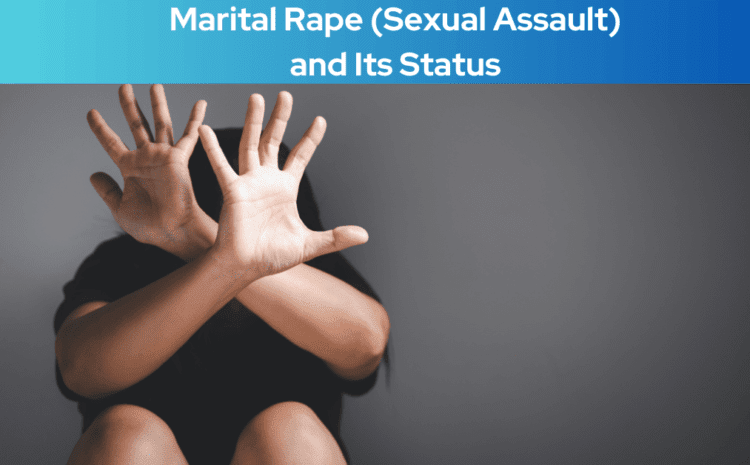
Marital rape (sexual assault), a form of sexual violence occurring within the institution of marriage, remains a highly contentious and complex issue. It involves non-consensual sexual acts perpetrated by a spouse, challenging the traditional notions of marriage, autonomy, and human rights. In the Indian legal system, the recognition and legal status of marital rape (sexual assault) have long been subjects of scrutiny and debate.
Within the framework of Indian law, the definition and treatment of marital rape have evolved against cultural, societal, and historical norms. The legal discourse surrounding marital rape (sexual assault) necessitates understanding the intricate interplay between the fundamental right to bodily integrity and the institution of marriage, as well as the balance between individual rights and social constructs.
The Indian legal system, rooted in the Indian Penal Code (IPC), is the primary source for addressing criminal offenses, including sexual violence. However, the absence of specific provisions criminalizing marital rape within the IPC has raised questions about protecting married individuals from sexual assault by their partners. This absence has drawn criticism from activists, legal experts, and international bodies who argue that it leaves a significant gap in ensuring justice and safeguarding the rights of survivors. We will look closer at each aspect of marital rape and its status in the Indian legal system while also focusing on how the best Women’s Law Protection Lawyers can help.

Concept of Marital Rape
Marital rape, the non-consensual sexual intercourse or acts of sexual violence committed by one spouse against the other within the institution of marriage, remains a largely unaddressed issue within the Indian legal system. While rape (sexual assault) is recognized as a criminal offense under Section 375, 376-B of the Indian Penal Code (IPC), marital rape (sexual assault) is not explicitly criminalized. This omission reduces married women to objects used solely for their spouse’s sexual gratification.
Marital rape (sexual assault) can involve using physical force, threats, or implied harm to coerce the spouse into sexual acts against their will. It can take various forms, such as forced-only rape (sexual assault), where threats and violence are used to coerce the wife; battering rape, which combines physical violence with sexual violence; and obsessive rape (sexual assault), characterized by sadistic and violent tendencies.
In India, the women’s law does not adequately account for marital rape (sexual assault) except in section 376-B of the India Penal Code and as defined in Section 3 of the Protection of women from Domestic Violence Act, 2005. Forced sexual intercourse is only considered an offense if the woman lives separately from her husband under judicial separation or custom. Furthermore, the private nature of marital rape (sexual assault) often means no witnesses or evidence available to prove the crime.
Addressing marital rape (sexual assault) requires a comprehensive legal framework recognizing and criminalizing this form of sexual violence. It necessitates upholding principles of consent, bodily autonomy, and equality within marital relationships. The current absence of specific provisions criminalizing marital rape perpetuates a significant gap in protecting the rights and safety of married individuals and undermines the principles of justice and human rights.
What is Indian Law on Marital Rape?
The Indian women’s protection law on marital rape is controversial and criticized due to its current framework. While the Indian Penal Code (IPC) addresses the crime of rape under Section 375 and 376-B, some exceptions specifically exclude marital rape from being considered an offense. This omission has drawn significant attention as it perpetuates the idea that non-consensual sexual acts within a marital relationship are not punishable.
- Section 375 of the Indian Penal Code (IPC):
Section 375 of the IPC defines the various acts that constitute rape committed by a man. However, the provision includes two exceptions that exempt certain situations from being classified as rape. Exception 2 states that sexual intercourse by a man with his wife, as long as she is not under fifteen years of age (recently increased to 18 years by the Supreme Court), is not considered rape or a crime against women. This exception has been widely criticized for undermining the principle of consent within a marital relationship.
- Domestic Violence Act, 2005:
The Protection of Women from Domestic Violence Act, 2005, acknowledges the possibility of marital rape by encompassing any form of sexual abuse within a live-in or marriage relationship as a form of domestic violence. However, it primarily provides civil remedies and does not offer a direct avenue for marital rape victims to initiate criminal proceedings against their perpetrators. This limitation restricts the legal options available to survivors of marital rape.
Issues with Marital Rape Exception:
- Against Basic Rights of Women:
The exception clause within the Indian law on marital rape violates several fundamental rights of women. It infringes upon their right to equality, freedom of speech and expression, and, most importantly, their right to life and personal liberty. By excluding marital rape from the definition of rape, it denies women agency over their own bodies and perpetuates gender inequality within marital relationships.
- Dismal State of Judicial System:
The low prosecution rates in cases of marital rape in India can be attributed to various factors related to the judicial system. These include:
- Low reporting of crimes due to societal conditioning and lack of legal awareness: Many women do not report incidents of marital rape due to social stigma, fear of retaliation, and a lack of understanding of their rights under the law.
- Inaccurate method of data collection by the National Crime Records Bureau (NCRB): The NCRB data may not accurately reflect the actual prevalence of marital rape due to underreporting or misclassification of cases.
- Out-of-court settlements: Lengthy legal processes and a lack of admissible proof often lead to victims opting for out-of-court settlements, as they may perceive it as a more accessible or quicker resolution.
Wrapping Up
The issue of marital rape in the Indian legal system is a pressing concern that demands immediate attention. Despite progress in recognizing women’s rights, the absence of a specific law criminalizing marital rape leaves countless women trapped in abusive relationships. It is crucial for lawmakers to enact comprehensive legal reforms that clearly define and criminalize this heinous crime while also addressing deep-rooted societal norms that perpetuate gender inequality.

Advocate Kiran S R – A highly skilled, passionate, dedicated advocate, with vast wealth of knowledge, professionalism, ethical approach and expert skills. One of the sharpest legal mindset brings the best principles of legal practice to the forefront. A qualified Engineer turned Advocate. His passion, dedication and vision to help and assist his clients achieve the best results is his driving force.

